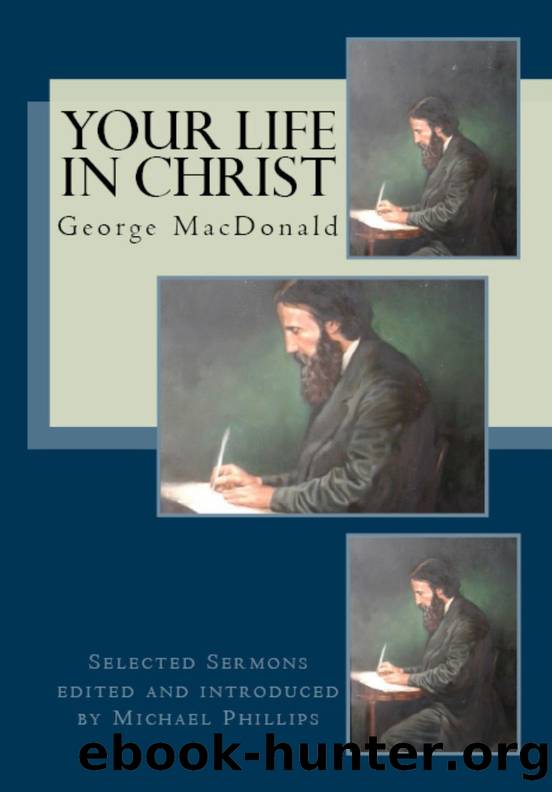Your Life in Christ by George MacDonald

Author:George MacDonald
Language: eng
Format: epub
Publisher: RosettaBooks
Published: 2018-08-15T00:00:00+00:00
â THE SELF AND THE WILL â
Christians have been talking of self-denial for almost two thousand years because Jesus so clearly taught it. But how many have practically made self-denial the ruling and guiding principle of their lives?
One of our difficulties is that we simply don't understand very deeplyâin a practical and moment-by-moment wayâjust how to deny ourselves as Jesus instructed. Does it mean I don't take another helping of dessert? Does it mean I don't buy the new suit I want but don't need? Does it mean I make do with a utilitarian car rather than enjoy the luxury of a nicer one? Does it mean I don't complain at unfair treatment though I dearly would like to? Does it mean I serve on the church committee though I would rather decline?
To address these and similar questions of how the thing is actually to be done, MacDonald offers one of the most brilliant, incisive, and altogether practical insights found anywhere in his writings. He separates for us the self and the will.
The self is the seat of our wants and desires, our fleshly and soulish inclinations.
The will is the seat of our decision-making power, that place within us where choices are made.
For most the two act in tandem, if not as a single entity, certainly as two conjoined components of a functioning whole. They are as two equal spatial globes, exerting exactly the same gravitational force and pull on the other and therefore inextricably linked and forever encircling round and round about each other.
In the example of the extra portion of dessert, for instance, for most the moment the desire is felt, the decision is made. I want, therefore I will. The self and will, functioning in complete harness and unity, act as a single expression of personhood. We observe, either in another or in ourselves, a single actâthe taking of another portion. We cannot even differentiate between the two internal impulses which lead to the act.
Now, one individual may take the extra slice of pie: I want, therefore I will. Another may decline it. But has the latter denied himself or herself? Or has merely a different desire of the self made itself felt more strongly: "I want to lose weight, therefore I will not take another piece of pie."
In both cases, the decision-making equation reduces to the joint and connected operation of the self and the will: I want, therefore I will.
In the case of a new suit, perhaps we might say, "I want . . . but I can't afford it." So perhaps the self is effectively denied what it wants. But have I denied myself? Has self-denial taken place? No. For if money was no object, the new car or new clothes would be no different than the extra slice of pie. The fact that the self may occasionally be thwarted is not the same as self-denial. I want, but can't does not equal self-denial.
It is the action upon the self, in response to its
Download
This site does not store any files on its server. We only index and link to content provided by other sites. Please contact the content providers to delete copyright contents if any and email us, we'll remove relevant links or contents immediately.
The 5 Love Languages: The Secret to Love That Lasts by Gary Chapman(9815)
The Space Between by Michelle L. Teichman(6942)
Assassin’s Fate by Robin Hobb(6223)
Wiseguy by Nicholas Pileggi(5787)
Everything Happens for a Reason by Kate Bowler(4743)
Gerald's Game by Stephen King(4654)
Pillow Thoughts by Courtney Peppernell(4284)
A Simplified Life by Emily Ley(4163)
The Power of Positive Thinking by Norman Vincent Peale(4065)
Harry Potter and the Prisoner of Azkaban (Book 3) by J. K. Rowling(3360)
Resisting Happiness by Matthew Kelly(3341)
Girl, Wash Your Face by Rachel Hollis(3282)
Being Aware of Being Aware by Rupert Spira(3277)
The Secret Power of Speaking God's Word by Joyce Meyer(3222)
The Code Book by Simon Singh(3189)
More Language of Letting Go: 366 New Daily Meditations by Melody Beattie(3030)
Real Sex by Lauren F. Winner(3023)
Name Book, The: Over 10,000 Names--Their Meanings, Origins, and Spiritual Significance by Astoria Dorothy(2987)
The Holy Spirit by Billy Graham(2953)
